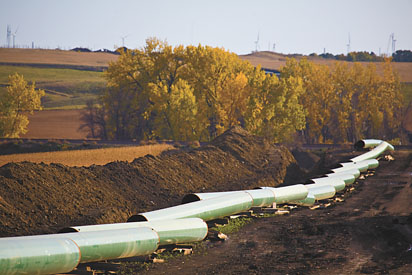Current Temperature
14.3°C
M.D. of Taber feeling the slump in oil sector
Posted on November 16, 2016 by Taber Times SQUEEKY WHEEL: Projects like the Keystone XL Pipeline are poised to resume barring any further regulatory hurdles. TIMES FILE PHOTO
SQUEEKY WHEEL: Projects like the Keystone XL Pipeline are poised to resume barring any further regulatory hurdles. TIMES FILE PHOTOBy Nikki Jamieson
Taber Times
njamieson@tabertimes.com
Although the Municipal District of Taber has been able to weather the oil downturn better versus its northern Alberta counterparts, it hasn’t entirely escaped it either.
While agriculture is the big industry driver in southern Alberta, oil still plays a large role in the region.
“The oil industry has always played a large part in the M.D.,” said Brain Brewin, reeve for the M.D. “Lately, like everywhere else, the oil industry has slipped a little bit, but certainly we still have active wells that are out there and still producing.”
As of press deadline, the price of oil stands at $45 a barrel. During the oil slump that has stretched on for two years, oil had briefly dipped below $30 a barrel earlier this year — a sharp decrease from the $100 barrel in late 2014 — and prices have been climbing and dipping ever since.
There is some cause for optimism, however. Brewin said he has heard of a few wells that are planned to set up later this year and early next year.
“I’m certainly not an oil expert, it’s just what I see,” said Brewin. “It sounds like it could be a slow recovery, that would be the best way of putting it. We’re struggling right now, but like I say, there is a lot more optimism in the industry then there has been in a lot of years. It certainly has given us an appreciation of our reliance on the importance of the oil industry within the M.D.”
Outside of the existing production wells, not much has gone on in the oil industry in the M.D. for the past year. Bankruptcies in companies have resulted in orphan wells, since they do not have the necessary funds or assets to decommission the wells, as legally required.
However, oil companies also pay into the Orphan Well Association — which is managed, in turn, by the Alberta Energy Regulator — who takes care of the reclamation and remediation of the orphaned well sites.
However, according to documents on the OWA’s website, as of early November, about 1,360 wells are listed as “to be abandoned”, with a further 660 are listed as “under reclamation”.
Additionally, as OWA receives its funding from oil companies, the more that go bankrupt, the less funding it will receive in order to clean up the orphan wells.
In their Fall 2016 newsletter, the M.D. had put in an article on what landowners should do if a company seemingly abandons a well or surface lease they had on the property of said landowner, with procedures to follow from the Alberta Surface Rights board to reclaim compensation, if damage was done. The steps are confirming the damage was done, applying to the board for recovery and then a Statutory Declaration is issued, followed by a notice to the well operator and a possible payment from the general revenue fund and followed by a hearing and inspection of the site. Brewin stressed that it was important for landowners to know the processes involved in reclaiming orphan wells and compensation due to damage done.
That being said, he heard in late October that oil companies were starting to hire again, which is a good sign for the industry.
“I think it’s going to be a slow, steady increase, is what I kind of predict. I don’t think it is going to be a boom, but I do believe it will be a slow, steady increase.”
While the oil industry is stagnant for now, energy companies are looking at investing in renewable resources in the M.D., in part thanks to Alberta’s Climate Leadership Plan and pledge to run on 30 per cent renewable energy by 2030. Although the investment is welcomed in the M.D. — provided residents do not oppose it like the controversial proposed Taber Solar Project — Brewin calls the need for renewable energy industry and the oil industry a “balancing act” between the two.
“I’ll be honest with you, I don’t think we’re ever going to get away from carbon-based fuels. But somewhere along here, there needs to be a balance between renewable energy and carbon-based oil energy,” said Brewin. “Right now, the pendulum is certainly going towards renewable, but I think sometime in the future, that pendulum will come back and strike balance between the two.”
“When the wind doesn’t blow, we have to have something else to produce electricity. I don’t think we, as a society, are willing to go without electricity because the wind isn’t blowing that day. So we always have to have that back-up in place.”
Leave a Reply
You must be logged in to post a comment.

